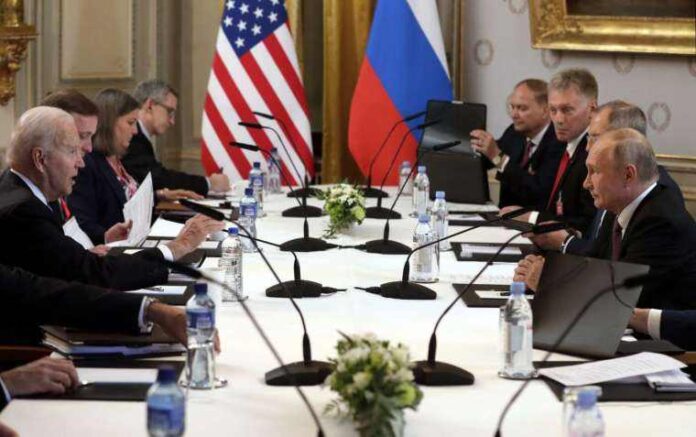On January 10, the one-day new round of strategic stability dialogue between Russia and the United States was held in Geneva, Switzerland. The delegations of the two sides were led by Russian Deputy Foreign Minister Ryabkov and US Deputy Secretary of State Sherman respectively. Analysts here pointed out that the fact that this dialogue can be held at least shows that neither Russia nor the United States rejects direct dialogue to resolve differences, contradictions and even hostilities, and it is expected that no substantive progress has been made.
Dialogue 'not making progress' on major issues
After the closed-door security dialogue that lasted about seven and a half hours, Ryabkov and Sherman released their results separately.
Ryabkov said at a press conference that the negotiation process was difficult, time-consuming, professional in content, and in-depth discussions, but the main issues were still unresolved. Russia did not believe that the United States had the will to resolve the ban on NATO's eastward expansion in the way described by Russia. , not deploying strike weapons on the Russian border, and restoring NATO's military deployment to the state in 1997 when Russia and NATO signed the basic relationship document. He pointed out that Russia and the United States have the most serious differences in the area of prohibiting NATO's eastward expansion. "Neither Ukraine nor Georgia must be able to become NATO members in the future. What we need is a legal guarantee, not a verbal commitment. ".
Sherman told the media through a conference call about the dialogue that it was a "serious, pragmatic and candid dialogue" and that the two sides had "frank discussions" on issues such as military exercises and the deployment of missiles in Europe. It "absolutely rejected" a series of proposals put forward by Russia, including asking NATO not to admit Ukraine as a member and terminating security cooperation with Ukraine, because it goes against the "openness" policy that is the core of the Atlantic alliance. She emphasized that it is not yet clear whether Russia is ready to reduce its military build-up around Ukraine after the talks. The decision-making process on European security issues must involve the Uzbek side. "The United States and Russia still have a long way to go."
In addition to reiterating their long-term positions on security issues, Russia and the United States also released "ruthless words" outside the venue. Ryabkov said Russia needs to see NATO's actions and "if the talks break down, Russia will respond in a military-technical way". Reuters believes that Russia is hinting at the possibility of redeploying intermediate-range nuclear missiles in Europe. The US "Wall Street Journal" quoted a so-called person familiar with the matter as saying that Washington is now unlikely to impose the largest energy or financial sanctions, so instead, it is considering more targeted measures, such as setting up export barriers to prevent the sale of cutting-edge chips to Russia. Products with a certain percentage of American technology and parts.
However, a negotiation that lasted for 7 and a half hours cannot quarrel from beginning to end, otherwise wouldn't it be simpler to just throw off the negotiating table? According to the "Wall Street Journal" report, Ryabkov emphasized that Russia has no intention of "attacking" Ukraine, and it is impossible to do so and believes that the dialogue between Russia and the United States is not hopeless. "The two sides, as well as Russia and NATO, have reached an agreement on security issues. The foundation is there." Reuters reported that the U.S. is interested in reaching an agreement on intermediate-range missiles by the principles of the now-defunct U.S.-Russia Intermediate-Range Nuclear Forces Treaty, and “the U.S. side is willing to discuss with Russia its proposal to limit the scale and scope of military exercises.”
Regarding whether to continue discussing European security issues through similar dialogues, neither Russia nor the United States announced their withdrawal but opened the door to another meeting. At the same time, the United States and Russia agreed that "a nuclear war cannot be won, nor can it be fought."
Russian Presidential Press Secretary Peskov said on the 11th that there is no deadline for security consultations, but Moscow opposes endless delays in the process. The Russian Satellite News Agency quoted him as saying that the results of the security consultations are very important, not just for "going through the motions", "similar dialogues will be held for several rounds, and then a clearer outline can be drawn." He said that there is no plan to hold a new round of high-level talks for the time being. "It is naive to think that a comprehensive outcome can be achieved through one round of talks."
The clouds of war in Europe are far from clear
The general view in the Russian strategic community is that the results of Russia-US consultations on security issues are in line with expectations. The most important thing at present is to understand what the consequences will be if the US and the West reject Moscow's proposals on key issues.
Timofeev, program director of the International Affairs Committee of the Russian think tank, said that the United States and its Western allies have expressed their views to a certain extent long before the meeting, so the outcome of the current dialogue is expected. Moscow articulates its position clearly, it is ready and without any hesitation. Strictly speaking, Russian decision-makers hope to discuss all these issues comprehensively, especially the eastward expansion of NATO, which is Russia's greatest concern. On the contrary, the U.S. side avoids important issues. On the one hand, the U.S. refuses to assure Russia that NATO will no longer expand eastward. Back to the "Intermediate-Range Nuclear Forces Treaty" and other remarks.
Lukyanov, chairman of the Presidium of the Foreign and Defense Policy Committee of the Russian think tank, pointed out that there has been no breakthrough in the Russia-US security dialogue, and there are fundamental differences in the negotiation thinking between the two sides. Russia insists on conducting dialogues at the political level, including discussions on security principles and the post-Cold War European security architecture; the United States hopes to shift the focus of security dialogues from political issues to military technology.
A UK-US Russia expert told the US Consumer News and Business Channel that "US and Western sanctions are ineffective against Russia." The implication is that the policy toolbox of the United States and the West to suppress Russia is about to bottom out.
Brenton, the former British ambassador to Russia, said that sanctions are not working, Russia has become more determined, and the United States and the West are also very rigid. "The two sides are getting closer and closer to a very dangerous point of security confrontation."
Stent, emeritus director of the Center for Eurasian, Russian and Eastern European Studies at Georgetown University, also acknowledged that while the proposed punitive measures were "quite comprehensive," the threat of sanctions could not make Russia back down. Neither setting up export barriers nor kicking Russia out of the international financial system can deter Russia, and the cloud of war in Europe has not dissipated.
Russia has no illusions about the US and the West
On November 18 last year, Russian President Vladimir Putin attended the enlarged meeting of the Ministry of Foreign Affairs and delivered a speech, clearly and comprehensively expounding Russia's policy towards the United States and the West. Even the two drafts of the Russia-US security treaty and the agreement on security measures between Russia and NATO are all "jobs" that Putin assigned to Russian Foreign Minister Lavrov at this meeting.
Putin pointed out that for Russia, the most acute and sensitive first is the internal crisis in Ukraine, which unfortunately is far from being resolved. The West is raising tensions by supplying Kiev with lethal modern weapons and holding provocative military exercises in the Black Sea and elsewhere close to Russia.
Putin reminded Russian diplomats that after several rounds of eastward expansion, NATO's military infrastructure is on Russia's border, anti-missile defense systems have been deployed in Romania and Poland, and it only takes a few minutes to change the software of the MK-41 vertical launch system. He asked Lavrov for this: "To ensure our security in this direction, the United States and NATO must provide Russia with long-term legally binding assurances because Russia does not know what may happen there tomorrow."
Subsequently, Putin successively commented on the relationship between Russia and the European Union, NATO and the United States. Ignoring the obvious benefits of interaction in the fields of political, economic and people-to-people exchanges, the EU continues to treat Russia with sanctions, unfriendly actions and baseless accusations, and opportunities for Russia-EU cooperation are shrinking, he said.
Putin pointed out that the relationship between Russia and NATO is depressing, and NATO is showing a clear confrontational attitude, stubbornly and moving its military infrastructure close to Russia's borders. In addition, NATO voluntarily broke all dialogue mechanisms and took sudden action to expel Russian diplomats without explaining why.
Putin also said that the above situation also applies to Russia-US relations, which are in an unsatisfactory state. Five years ago, the U.S. administration began a provocative policy of imposing massive bans and restrictions on Russian diplomats, which have been detrimental to this day.
Although Putin "has no illusions" about the United States, he still tries to gradually adjust and straighten out the relationship through dialogue. After the "Geneva Summit" between Russia and the United States in June last year, although the two countries have made limited progress in the fields of strategic stability and information security, they have continued to bottom out in bilateral diplomacy and regional security issues.
"Ten years of negotiation is better than a one-day war"
According to the plan, Russia held talks with NATO and OSCE on the 12th and 13th successively. Public opinion generally believes that the Russia-US security dialogue held on the 10th is the most critical, setting the tone for the next two dialogues.
Dialogue with NATO can be regarded as an expanded version of the Russia-US dialogue. On December 17 last year, Russia released the "Draft Agreement on Security Measures between Russia and NATO", requesting to exclude the possibility of further expansion of NATO and Ukraine's joining NATO; Deploy additional troops and weapons beyond countries that have deployed troops and weapons before May; NATO renounces any military activities in Ukraine, Eastern Europe, Transcaucasus, and Central Asia; and refrains from deploying short- and medium-range missiles where they can attack each other's territory.
In an interview with Russian media on January 6, Ryabkov said that Russia will not take a position of "denying everything" in the dialogue with NATO on security issues, but will strive to find a solution based on the balance of interests. "Our position will be quite strong, and there will be no other attitudes. Before, we were always 'persuading' the interlocutor, but just like the conclusion of Krylov's fable - the speaker is earnest, and the listener is contemptuous". He said that the inseparable and necessary elements of the agreement include that NATO will no longer be close to the Russian border, will not accept new members, and will not deploy weapons on relevant territories, including Ukraine, and conduct provocative exercises.
NATO Secretary-General Stoltenberg said after a video conference of the foreign ministers of the organization's member states on January 8 that NATO intends to have a fruitful dialogue with Russia, but will not discuss key security issues and the rights of countries to join NATO. make a compromise. "The foreign ministers discussed security and defense issues and formed a unified position," he said.
Igor Ivanov, chairman of the Russian think tank International Affairs Committee, who served as foreign minister for more than five years from 1998 to 2004, previously said that negotiations between Russia and the United States, Russia and NATO and the OSCE on key security issues have It is difficult and important, and we cannot expect to reach an agreement quickly, let alone make a radical decision. "In recent years, the positions of all parties have diverged greatly, and almost all arms control mechanisms and international law in the security field have been destroyed or not respected." However, he said the negotiations were providing an opportunity to reach a deal, "people should keep in mind that 'Ten years of negotiations are worth a day's war' - the words of my teacher, Soviet Foreign Minister Gromyko, are still very wise!"







































